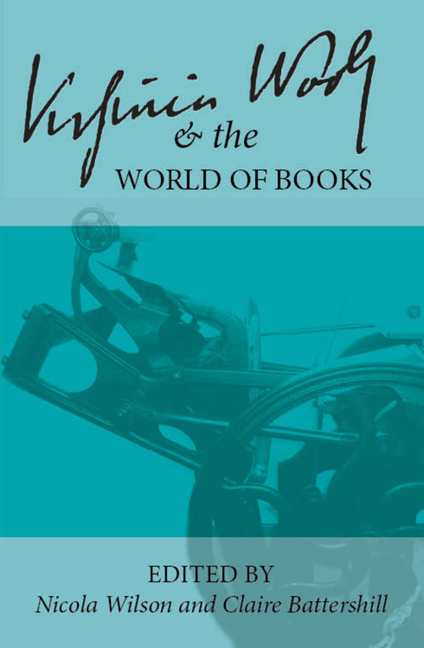 Virginia Woolf and the World of Books
Virginia Woolf and the World of Books Book contents
- Frontmatter
- Contents
- Introduction
- List of Abbreviations
- Keynote
- In the Archives
- Craftsmanship
- The Hogarth Press
- Hours in A Library
- The Art of the Book
- The Art of the Narrative
- Woolf as a Model Builder: Complex Form in the “Ode to Cutbush”
- “Books Were Not in Their Line”: The Material Book and the Deceptive Scene of Reading in To the Lighthouse
- Mrs. Brown and the Trojan Cow: Deconstructing Aristotle in “An Unwritten Novel”
- Making New Books: Creative Approaches
- The Book in the World: Woolf's Global Reception
- Editing and Teaching Woolf
- Intertextuality
- Lives in Writing
- Notes on Contributors
Mrs. Brown and the Trojan Cow: Deconstructing Aristotle in “An Unwritten Novel”
from The Art of the Narrative
- Frontmatter
- Contents
- Introduction
- List of Abbreviations
- Keynote
- In the Archives
- Craftsmanship
- The Hogarth Press
- Hours in A Library
- The Art of the Book
- The Art of the Narrative
- Woolf as a Model Builder: Complex Form in the “Ode to Cutbush”
- “Books Were Not in Their Line”: The Material Book and the Deceptive Scene of Reading in To the Lighthouse
- Mrs. Brown and the Trojan Cow: Deconstructing Aristotle in “An Unwritten Novel”
- Making New Books: Creative Approaches
- The Book in the World: Woolf's Global Reception
- Editing and Teaching Woolf
- Intertextuality
- Lives in Writing
- Notes on Contributors
Summary
Let's begin, as a number of modernist texts do, with the cow. Of all the unexpected, apparently random, unexplicated details of Virginia's Woolf 's 1919/20 short story, “An Unwritten Novel,” the one that bothers me the most is the wooden cow in the meadow. Signaling the transition from the story's frame to its main narrative, the cow makes its appearance in the sixth paragraph, just after the train has passed through Three Rivers Station and crossed the border into Sussex. The woman passenger has spoken for the first time, and from the fragments of her utterance and the hints offered by her body language—“she fidgeted as though the skin on her back were as a plucked fowl's in a poulterer's shop window” (CSF 113)—the narrator begins to anticipate a story with an Aristotelian turn or perepitia which will launch the tragic action: “Ah, now we approached the catastrophe” (CSF 113). But instead of unfolding the details of her plot, the woman's story is rather rudely interrupted by a cow—a “great wooden cow in the meadow”—which shocks her and saves her from “some indiscretion” or revelation (CSF 113). What are we to make of this blocking anomaly: presumably some form of advertisement? What invading warriors does the Trojan cow hide?
Thinking metaphorically, I first hypothesized that the cow serves as a variation on the distinction between life (what Aristotle would call the possible) and the artistic appearance of life (the probable): there is the real cow and then there is the artificial scaffolding of a cow, cobbled together according to the conventional rules of writing, just as there is the real passenger and the one invented by the narrator.
Wanting to expand my thinking visually, I then began to look for images of wooden cows on the Internet. And I found…Pasiphae. Do you know who she is? The mother of the Minotaur. Her husband Minos angered Poseidon by not sacrificing enough, and, gods being gods, Poseidon decided to get his revenge by humiliating not Minos but Minos's wife. So he made Pasiphae totally, madly, and specifically erotically in love with Minos's favorite white bull (something of a family proclivity since Minos's mother was Europa, but I digress).
- Type
- Chapter
- Information
- Virginia Woolf and the World of BooksSelected Papers from the Twenty-seventh Annual International Conference on Virginia Woolf, pp. 155 - 160Publisher: Liverpool University PressPrint publication year: 2018


